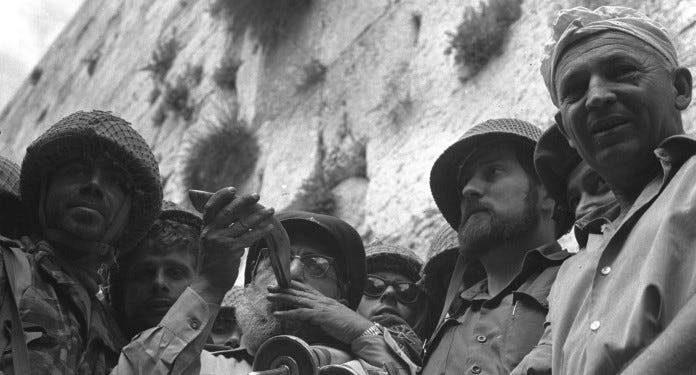CENSORED: Yom Yerushalayim
The real reason why charedim do not acknowledge it
In my numerous years spent in intensive study at various charedi yeshivos, I was never once aware when it was Yom Yerushalayim. There were no celebrations, no speeches about the significance of either the extraordinary military victory or the liberation of Jerusalem, no Hallel, and we said tachanun as usual. It wasn’t one of the most momentous days in history for the Jewish People in the last 2000 years, it was just another Monday.
You might think that this is no different from the charedi studious refusal to acknowledge Yom Ha’Atzma’ut, but it’s actually more extreme. Yom Ha-Atzma’ut is “tainted” by secular Zionist ideology, but Yom Yerushalayim is not. The military victory was not one of attaining sovereignty for a secular state but one of survival. The Arab armies had twice as many aircraft, twice as many tanks, twice as many soldiers. Nasser declared that the goal was to destroy Israel and that he had become confident that this was possible. Ahmed Shukeiry, commander of the PLO, stood alongside King Hussein in Amman and declared that Jews born outside of Israel would be repatriated, and those born in Israel would be killed. In Israel, parks were quietly prepared for conversion into mass graves. And yet Israel won the war in an astonishingly short period. 777 soldiers fell and 2,586 were wounded, but it could have been much, much worse.
Yom Yerushalayim also has religious significance in the liberation of Jerusalem. This is expressed in halacha. There is a tradition to tears one’s clothing upon seeing the ruins of the Beis HaMikdash. This is taken very seriously in the charedi world (and a workaround is used in which people will sell their clothing to someone else before visiting the Kotel in order not to have to tear it). But the Gemara which is the source for this declares that one must also do this upon seeing the ruined city of Jerusalem. Yet nowadays, nobody does this, because Jerusalem has been rebuilt and is under Jewish control (which the Mishnah Berurah and others rate as being the decisive factor). This is not simply a technical matter, like how when Pringles changed the way of making potato chips the beracha changed to shehakol. Rather, it signifies that something of profound significance in Judaism has happened.
Now, you could offer an argument against this. For even Rav Soloveitchik ruled that the law about rending one’s garments upon seeing Jerusalem has not changed, for technical reasons about it being also related to the lack of a Beis HaMikdash. But I came across an extraordinary proof that the charedi world’s refusal to acknowledge Yom Yerushalayim is not about a genuine religious/ halachic principle.
(If you hit a paywall at this point, it means that you are not a paid subscriber. As noted in the previous post, Rationalist Judaism has been split off from the Torah and Nature Foundation, which funds the Biblical Museum of Natural History. While I am still working on both, the finances have been separated just as the missions are separate. This means that paid subscriptions to this blog - which are much appreciated and invaluable in making it possible - are no longer directed to the foundation (and thus are also no longer tax-exempt). Unfortunately, much to my dismay, when I implemented this change in the system, the platform cancelled all the subscriptions for paid subscribers! And so paid subscribers need to re-subscribe, but I will be offering additional bonus material for you, along with access to the rest of posts such as this one.)
Keep reading with a 7-day free trial
Subscribe to Rationalist Judaism to keep reading this post and get 7 days of free access to the full post archives.



